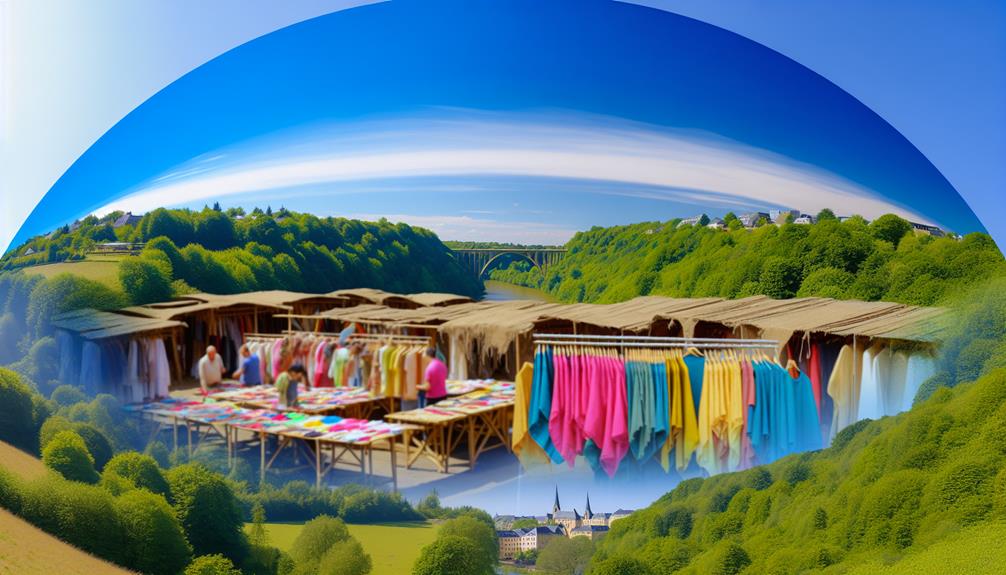
Luxembourg is pioneering sustainable fashion by emphasizing environmentally responsible practices and ethical production techniques. Local designers are leading the charge, utilizing eco-friendly materials and innovative designs that prioritize quality and longevity. The government actively supports this shift through initiatives and financial incentives aimed at promoting responsible practices. Circular economy principles reinforce the commitment to reducing waste and fostering community engagement. Educational campaigns are also enhancing consumer awareness regarding sustainable choices. As Luxembourg continues to cultivate a culture of sustainability within the fashion industry, its journey presents a fascinating case study in responsible consumption and innovation. There's much more to explore in this evolving narrative.
Key Takeaways
- Luxembourg's fashion scene emphasizes sustainable materials like organic cotton and recycled polyester, promoting eco-friendly production methods.
- Local designers are committed to ethical practices, utilizing innovative fabrics and upcycled materials to reduce environmental impact.
- Government initiatives support sustainable fashion through financial incentives and educational resources, fostering industry-wide awareness.
- Circular economy principles are adopted, focusing on product longevity, recycling strategies, and community engagement for sustainable practices.
- Educational campaigns empower consumers with knowledge about sustainable fashion, encouraging mindful purchasing and ethical consumption.
Overview of Sustainable Fashion
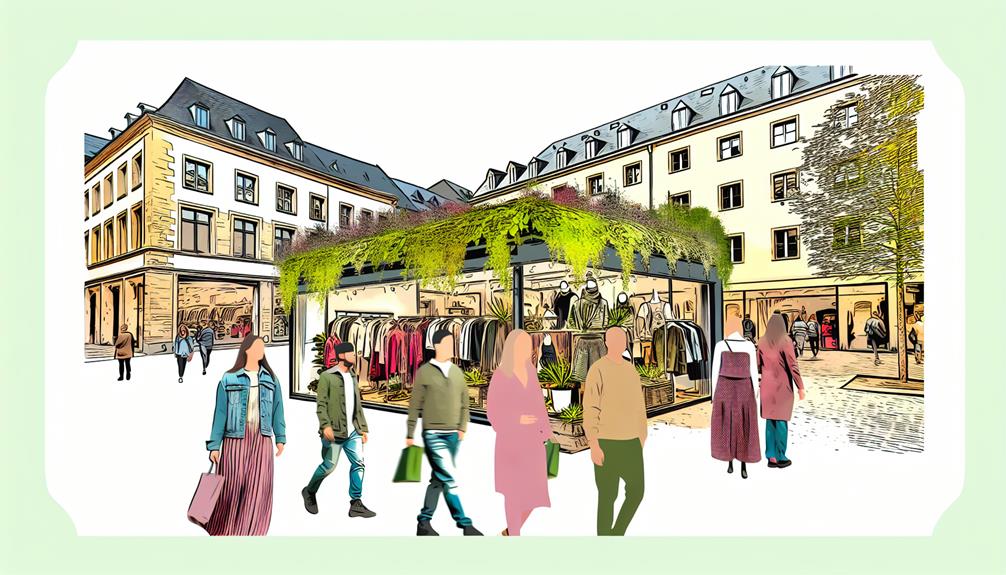
Sustainable fashion is increasingly recognized as a vital movement within the global textile industry, responding to the urgent need for environmentally and socially responsible practices. This approach not only seeks to minimize waste and reduce carbon footprints but also emphasizes the importance of ethical labor practices. Environmental Awareness Days serve as platforms for raising consciousness about ecological issues in the fashion industry, encouraging brands to adopt sustainable practices. At its core, sustainable fashion champions the use of sustainable materials, such as organic cotton, recycled polyester, and innovative fabrics derived from natural resources, which considerably diminish the environmental impact associated with traditional textile production.
Moreover, fashion technology plays an essential role in advancing sustainable practices. Innovations in manufacturing processes, such as 3D printing and digital design, enable brands to create garments with reduced waste and enhanced resource efficiency. These technologies facilitate the development of a circular economy, where products are designed for longevity and recyclability.
As consumers increasingly seek out brands that align with their values, the sustainable fashion movement fosters a sense of belonging within communities committed to positive change. By embracing sustainable practices, individuals and brands alike contribute to a more responsible and inclusive fashion landscape, ultimately paving the way for a brighter, more sustainable future in Luxembourg and beyond.
Key Players in Luxembourg's Fashion Scene
Luxembourg's fashion scene is characterized by a dynamic blend of innovation and tradition, with various key players actively shaping its landscape. Luxury brands, both local and international, serve as cornerstones, pushing boundaries in style while embracing retail sustainability. Significantly, these brands participate in fashion events that not only showcase collections but also emphasize social responsibility, reflecting a growing commitment to ethical practices. By establishing clear wellness metrics and health benchmarks, these brands align their goals with sustainable practices to guarantee lasting impact, creating a roadmap for motivation and well-being goal alignment for motivation.
Influencers play a significant role in this transformation, leveraging their platforms to promote sustainable marketing initiatives and engage consumers in meaningful conversations about fashion choices. Their impact extends beyond mere promotion, fostering a sense of community and belonging among those who value sustainability.
Moreover, brand collaborations are on the rise, as designers unite to create collections that prioritize eco-friendly materials and processes. This collaborative spirit is mirrored in fashion education programs that empower the next generation of designers to embrace sustainable practices from the outset. By nurturing creativity and social responsibility, these key players are not only redefining Luxembourg's fashion identity but also paving the way for a more sustainable future. Together, they contribute to a vibrant ecosystem that celebrates fashion's potential for positive change.
Circular Economy Principles
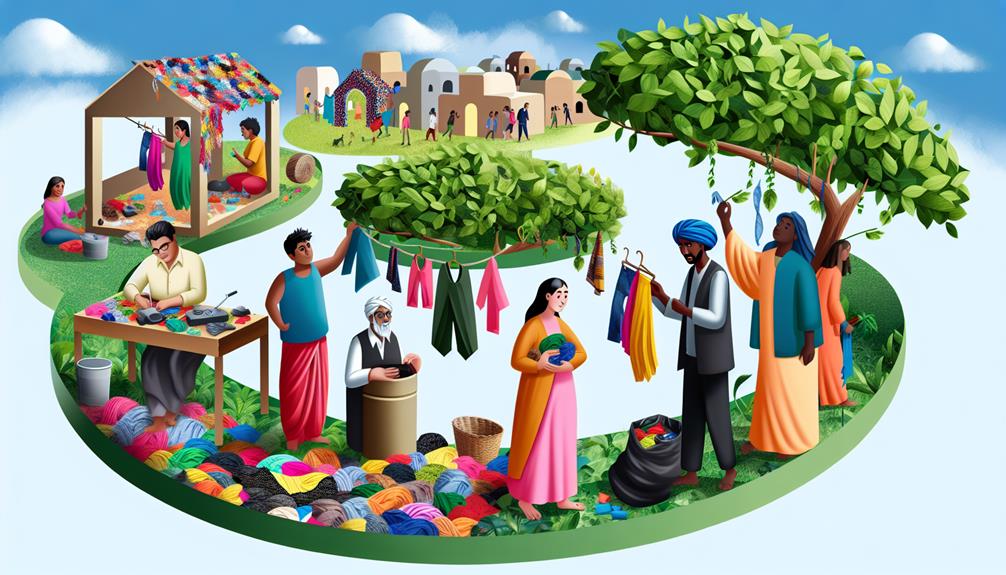
How can the fashion industry effectively minimize waste and maximize resource efficiency? Embracing circular economy principles is key to transforming traditional practices into sustainable ones. Circular design focuses on creating products that prioritize longevity, facilitating waste reduction and extending the product lifespan. By incorporating sustainable sourcing and innovative design strategies, brands can guarantee that materials are not only responsibly obtained but also easily recyclable at the end of their life cycle. Additionally, understanding the importance of preventive services in promoting overall well-being can parallel the fashion industry's efforts to enhance sustainability by fostering a culture of proactive resource management.
Implementing recycling strategies is essential in fostering closed loop systems where materials are reused, reducing reliance on virgin resources. This not only mitigates environmental impact but also encourages a community-oriented approach where consumers feel empowered to participate in sustainability efforts.
The shift towards circular economy principles not only enhances resource efficiency but also promotes a sense of belonging among consumers who value environmentally-conscious practices. By adopting these principles, the fashion industry can cultivate a culture of responsibility, where every stakeholder, from designers to shoppers, plays a pivotal role in creating a more sustainable future. Ultimately, the integration of circular economy principles into fashion paves the way for a thriving, responsible industry that resonates with today's conscious consumers.
Eco-Friendly Materials and Innovations
The fashion industry's evolution towards eco-friendly materials and innovations represents an essential shift in addressing environmental concerns. As consumers increasingly seek sustainable options, brands in Luxembourg are embracing biodegradable textiles and renewable fibers that minimize ecological footprints. These materials not only offer durability but also contribute to waste reduction at the end of their life cycle. By adhering to principles similar to the Expense Recognition Principle, brands can guarantee that their investments in sustainable practices are reflected accurately in financial reporting, promoting transparency and reliability for stakeholders.
Innovative dyes derived from natural sources are gaining traction, reducing harmful chemical usage and promoting healthier production practices. Coupled with sustainable sourcing strategies, these advancements guarantee that every aspect of the supply chain prioritizes environmental stewardship. The use of upcycled materials further exemplifies this commitment, transforming discarded fabrics into valuable resources, thereby reinforcing a circular economy.
Moreover, green certifications play a pivotal role in establishing trust and transparency, guiding consumers toward responsible purchases. Brands are also adopting eco-conscious packaging to enhance their sustainability profiles, reducing plastic waste and promoting recyclable options. This collective effort not only fosters a community of environmentally conscious consumers but also inspires a cultural shift within the fashion industry, highlighting that style and sustainability can coexist harmoniously. Together, these innovations are paving the way for a more responsible fashion future in Luxembourg.
Local Designers Making an Impact
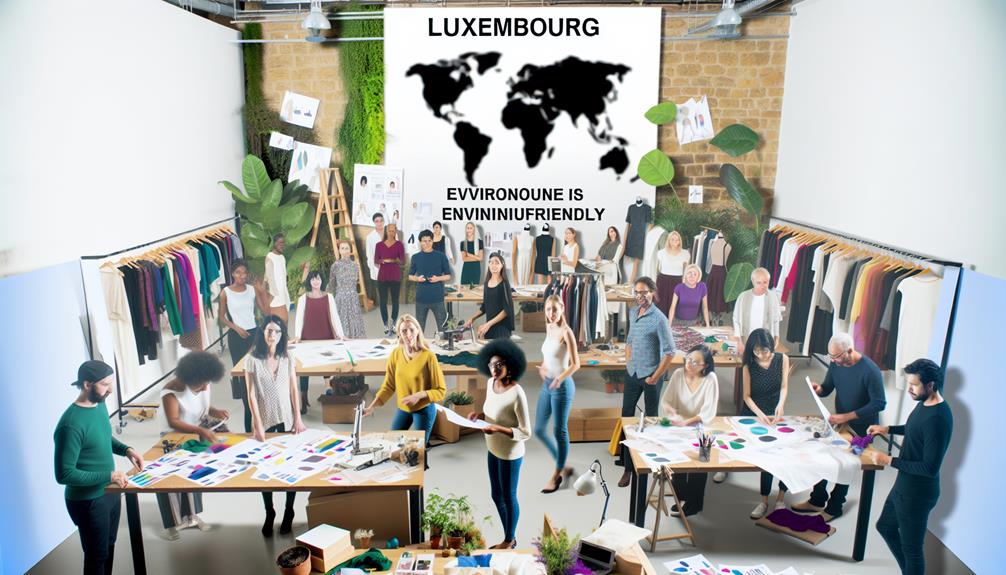
Local designers in Luxembourg are increasingly prioritizing eco-friendly material choices and ethical production techniques, reflecting a growing commitment to sustainability in the fashion industry. By utilizing innovative fabrics and responsible manufacturing processes, these creatives are not only reducing environmental impact but also promoting social responsibility. This shift mirrors a broader trend in consumer preferences, where individuals are seeking comprehensive coverage for every stage of life, emphasizing the importance of mindful consumption. Their efforts are setting a precedent for a new era of fashion that values quality and integrity alongside style.
Eco-Friendly Material Choices
In recent years, a growing number of designers in Luxembourg have embraced eco-friendly material choices, considerably impacting the sustainable fashion landscape. By prioritizing organic textiles and biodegradable fabrics, these innovators are redefining what it means to create fashion with a conscience. The use of sustainable dyes, crafted from natural sources, further enhances the eco-friendly ethos, ensuring that garments are not only beautiful but also kind to the planet.
Local designers are increasingly turning to recycled fibers and upcycled fashion, breathing new life into discarded materials and reducing waste. This commitment to eco-conscious sourcing reflects a broader movement towards innovative materials that minimize environmental impact while maximizing style and functionality. Additionally, many of these designers are obtaining ethical certifications, which serve as a proof of their dedication to sustainable practices.
As consumers become more attuned to the importance of sustainability, the appeal of these eco-friendly choices grows. By supporting local designers who champion these principles, the community fosters a sense of belonging and collective responsibility toward a more sustainable future in fashion. Together, they are not just creating garments; they are paving the way for a transformative shift in the industry.
Ethical Production Techniques
Numerous designers in Luxembourg are pioneering ethical production techniques that prioritize fair labor practices and transparency throughout the manufacturing process. By focusing on fair trade and cultivating a transparent supply chain, these local innovators are setting a precedent for a more responsible fashion industry.
Here are three key approaches being embraced by these designers:
- Local Sourcing: Many designers source materials locally, reducing carbon footprints and supporting the local economy. This practice not only fosters community engagement but also guarantees quality and sustainability.
- Fair Labor Practices: Emphasizing fair wages and safe working conditions, designers commit to ethical labor standards. This commitment helps build trust with consumers who value social responsibility.
- Artisan Collaborations: Collaborating with local artisans allows designers to preserve traditional craftsmanship while promoting cultural heritage. This not only enriches the designs but also empowers artisans through fair compensation.
Consumer Awareness and Education
Consumer awareness and education play a vital role in promoting sustainable fashion choices among consumers in Luxembourg. Educational campaigns and initiatives are essential in equipping individuals with the knowledge needed to make informed decisions, thereby fostering a culture of sustainability. By understanding the environmental and social impacts of their purchasing habits, consumers can actively contribute to a more responsible fashion industry.
Importance of Sustainable Choices
Awareness stands as a cornerstone in the journey towards sustainable fashion, particularly in a region like Luxembourg where the fashion industry is evolving to embrace eco-conscious practices. The importance of making sustainable choices cannot be overstated, as consumer behavior directly influences the industry's trajectory. By fostering a culture of awareness, individuals can contribute to a more sustainable future through informed decisions.
Here are three crucial aspects of this shift towards sustainable consumption and ethical shopping:
- Empowerment: Understanding the impact of fashion choices empowers consumers to support brands that prioritize sustainability, thereby encouraging responsible practices within the industry.
- Community Building: Engaging in sustainable practices fosters a sense of belonging among like-minded individuals who value ethical consumption, creating a supportive network for sharing resources and ideas.
- Environmental Impact: By choosing sustainable options, consumers collectively reduce their carbon footprint, contributing to a healthier planet for future generations.
As Luxembourg continues to refine its fashion landscape, the role of consumer awareness and education remains essential. Together, informed choices can redefine fashion, making sustainability a shared value that nurtures both the environment and community.
Educational Campaigns and Initiatives
In recent years, Luxembourg has witnessed a surge in educational campaigns and initiatives aimed at promoting sustainable fashion practices. These efforts focus on enhancing consumer awareness and fostering a sense of belonging within the community. By hosting educational workshops, local organizations empower individuals to make informed choices regarding their fashion consumption, highlighting the environmental impacts of fast fashion and the benefits of sustainable alternatives.
Community engagement plays an essential role in these initiatives, as it creates a platform for dialogue and shared experiences among participants. Events such as clothing swaps and sustainable fashion fairs not only educate but also cultivate a community spirit, encouraging collaboration and support for one another in adopting sustainable habits. Through interactive sessions and expert-led discussions, the workshops inspire attendees to embrace eco-friendly practices, from mindful purchasing to upcycling and recycling.
As consumers increasingly seek to align their values with their purchasing decisions, these educational campaigns serve as a significant resource. They not only equip individuals with the knowledge needed to navigate the complexities of sustainable fashion but also foster a collective commitment to making a positive impact on the environment.
Collaborations and Partnerships
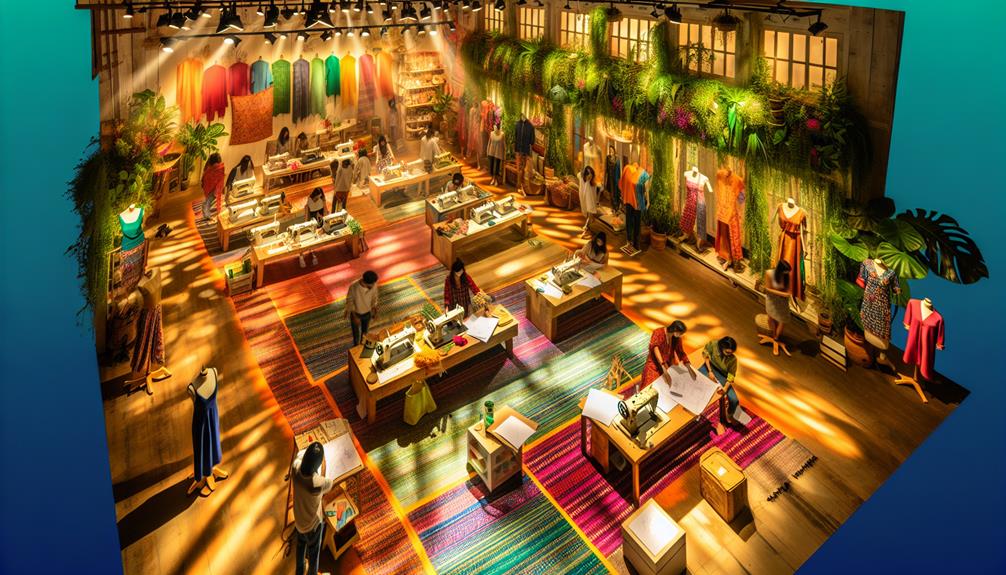
Numerous collaborations and partnerships are emerging in Luxembourg's fashion industry, reflecting a collective commitment to sustainability. These efforts are driven by a spirit of innovation and a desire to engage with the community, fostering a sense of belonging among stakeholders.
Key sustainable collaborations include:
- Local Initiatives: Designers and artisans are uniting to create eco-friendly collections, showcasing the beauty of local craftsmanship while minimizing environmental impact.
- Fashion Alliances: Brands are forming strategic partnerships to share resources, knowledge, and best practices, enhancing their sustainability efforts through collaborative industry networking.
- Cross-Sector Partnerships: Collaborations with NGOs and educational institutions are paving the way for innovative solutions, promoting sustainable practices that resonate within the community.
These partnership models not only elevate the fashion landscape in Luxembourg but also emphasize the importance of community engagement. By coming together, stakeholders can amplify their impact and foster a culture of sustainability. As these alliances continue to grow, they serve as a demonstration of the collective belief that the future of fashion can be both stylish and responsible.
Government Support and Policies
The growing emphasis on sustainability within Luxembourg's fashion sector is further supported by proactive government initiatives and policies. Recognizing the urgent need for environmentally responsible practices, the Luxembourg government has established a thorough policy framework aimed at promoting sustainable fashion. This includes financial incentives for brands that adopt eco-friendly materials and production processes, as well as grants for innovative startups focused on sustainability.
Moreover, the government actively collaborates with industry stakeholders to develop educational programs and resources that raise awareness about sustainable practices among consumers and businesses alike. Initiatives such as the "Sustainable Fashion Week" showcase local designers who prioritize ethical production, fostering a sense of community among environmentally conscious consumers.
These government initiatives not only aim to reduce the fashion industry's ecological footprint but also encourage a cultural shift towards sustainability. By creating an ecosystem that supports responsible practices, the government strengthens the connection between fashion and environmental stewardship, allowing individuals to feel empowered in their choices. This collaborative approach cultivates a community that values sustainability, making Luxembourg a beacon for those seeking to engage in responsible fashion consumption.
Future Trends in Sustainable Fashion
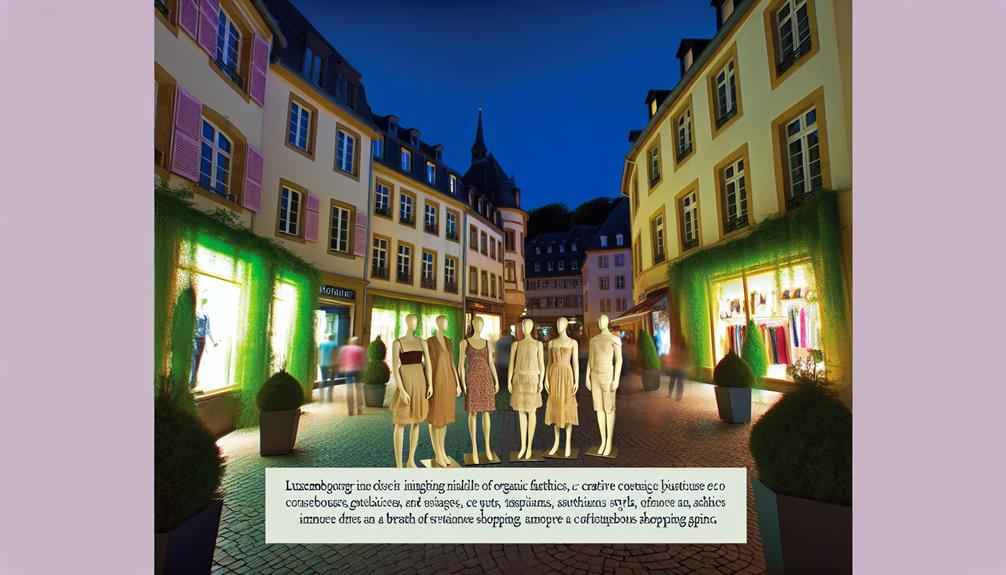
Emerging technologies and innovative materials are poised to redefine the landscape of sustainable fashion in Luxembourg and beyond. As eco-conscious demographics shift consumer behavior, brands must adapt to meet the heightened demand for transparency and sustainability. Future innovations will be shaped by several key trends:
- Digital Technologies: Advancements such as AI and blockchain will enhance brand transparency, allowing consumers to trace the origins of their garments, thereby fostering trust and loyalty.
- Sustainable Marketing: Brands will increasingly leverage social media to communicate their eco-friendly practices, resonating with consumers who prioritize sustainability in their purchasing decisions.
- Fashion Psychology: Understanding the emotional connection consumers have with fashion will drive lifestyle changes, as brands create collections that not only reflect personal style but also ethical values.
These trends will be heavily influenced by global influences, encouraging a collective movement towards responsible fashion. As the industry embraces these changes, it will not only nurture a sense of belonging among consumers but also inspire a culture of sustainability that aligns with the values of a conscientious world. The journey toward sustainable fashion is not just a trend; it is a commitment to shared responsibility for our planet's future.
Frequently Asked Questions
How Can Consumers Identify Sustainable Fashion Brands in Luxembourg?
Consumers can identify sustainable fashion brands by looking for ethical certifications such as GOTS, Fair Trade, or OEKO-TEX, which indicate adherence to environmentally responsible practices. Additionally, brand transparency is vital; companies that openly share their sourcing, production processes, and labor practices are more likely to prioritize sustainability. Engaging with brands that align with these values fosters a sense of belonging to a community committed to ethical consumption and environmental stewardship.
What Are the Benefits of Sustainable Fashion for Local Communities?
Sustainable fashion offers numerous benefits for local communities, primarily through community empowerment and heightened environmental awareness. By supporting ethical brands, consumers contribute to local economies, fostering job creation and skill development. Additionally, sustainable practices promote a culture of responsibility, encouraging community members to engage in environmentally conscious behaviors. This collective commitment not only strengthens social bonds but also cultivates a sense of belonging, as individuals unite to create a more sustainable future for their environment.
Are There Any Sustainable Fashion Events in Luxembourg?
Yes, Luxembourg hosts various sustainable fashion events that foster community engagement and promote eco-conscious practices. These events include eco-friendly workshops, where participants can learn about sustainable materials, upcycling techniques, and ethical fashion design. Such gatherings not only enhance awareness of sustainable fashion but also create a sense of belonging among individuals passionate about making a positive impact. By attending, community members can connect, share ideas, and contribute to a more sustainable future.
How Does Sustainable Fashion Impact the Economy of Luxembourg?
Sustainable fashion greatly influences Luxembourg's economy by fostering economic growth through innovation and job creation. As consumers increasingly prioritize ethical sourcing and eco-friendly production, businesses that adopt sustainable practices can attract a dedicated clientele, enhancing their market position. This shift not only supports local artisans and suppliers but also encourages investment in green technologies, ultimately contributing to a more resilient economy. Embracing sustainable fashion cultivates a community committed to environmental stewardship and social responsibility.
What Role Do Social Media Influencers Play in Promoting Sustainable Fashion?
Social media influencers play a pivotal role in promoting sustainable fashion by leveraging their platforms to shape consumer perceptions and behaviors. Through targeted marketing strategies, influencers create authentic connections with their audience, fostering a sense of community around sustainable choices. Their impactful narratives not only raise awareness but also drive engagement, encouraging followers to embrace eco-friendly brands and practices. This dynamic relationship enhances the visibility of sustainable fashion, making it more accessible and appealing to a broader audience.




